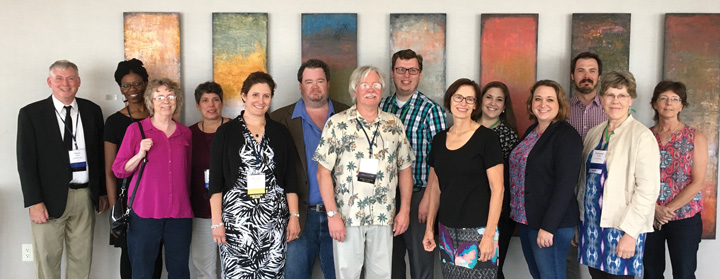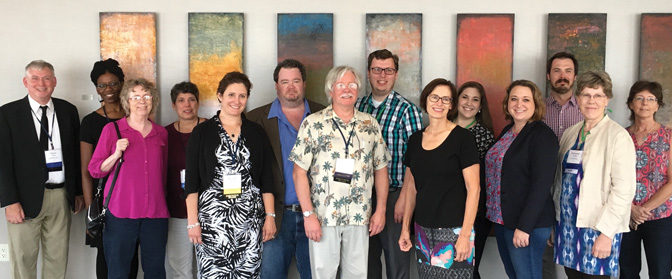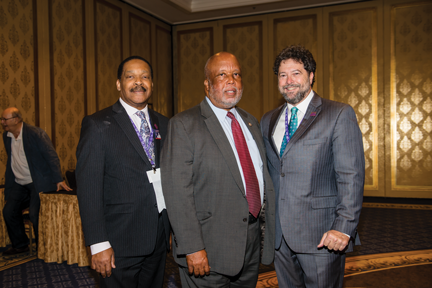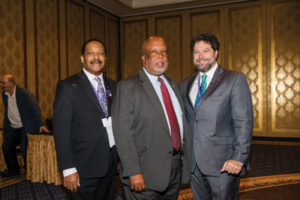 by Karen Sandene, ROPA Secretary and Member of Locals 70-558 (Omaha, NE) and 463 (Lincoln, NE)
by Karen Sandene, ROPA Secretary and Member of Locals 70-558 (Omaha, NE) and 463 (Lincoln, NE)
During the first week of August, delegates representing orchestras from all corners of the nation convened in Phoenix, Arizona, for the 33rd Annual Regional Orchestra Players Association (ROPA) Conference, hosted by Local 586 (Phoenix, AZ) and Arizona Opera Orchestra, with activities centered at the Westin Downtown Phoenix Hotel. ROPA’s annual conference is one of the most important benefits of ROPA membership. Information gleaned the conference assists with negotiating, organizing, and understanding the current state of the orchestral world.
Central themes highlighted throughout this year’s conference were diversity and inclusiveness in the symphonic world. Several excellent guest speakers offered their perspectives over several days. Local 699 (Houston, TX) President Lovie Smith-Wright gave the AFM Diversity Committee report. Phoenix Symphony Principal Clarinet Alex Laing of Local 586 offered a detailed description of plans for recognizing the diversity in our locals and in orchestras. As part of his report, AFM Legislative-Political Director and Director
of Diversity Alfonso Pollard shared information about musicians from minority groups who hold positions in symphony orchestras. On the final day, Metropolitan Opera Orchestra Trombonist Weston Sprott of Local 802 (New York City) presented “Actionable Strategies to Make Your Orchestra More Diverse and Inclusive.”

ROPA Board Members include (L to R): Steve Wade, Maya Stone, Mary Anne Lemoine, Lisa Davis, ROPA Treasurer Donna Loomis, ROPA Vice President Dave Shelton, ROPA President Mike Smith, Sean Diller, ROPA Secretary Karen Sandene, Amanda Swain, Naomi Bensdorf Frisch, Taylor Brown, Katie Shields, Nancy Nelson. Not pictured: Marika Fischer Hoyt.
Informative Sessions
The opening session featured addresses by Local 586 President Jerry Donato, Arizona Opera General Director Joe Specter, and Arizona Commission for the Arts Communications Director Steve Wilcox. Donato reported that union membership in the area is up, despite the fact Arizona is a “right to work” state. He shared recruiting techniques Local 586 implements. Specter highlighted several of the opera company’s successful projects. Wilcox reinforced the common knowledge that arts and culture radiate throughout the economy. The final presentation of this first morning was a well-received presentation on hearing protection with Heather Malyuk, AuD, of Sensaphonics.
Delegates spent much of the first day in valuable small group discussions with their members-at-large, sharing information with orchestras of similar budget sizes. Wrapping up official business for the first day, new delegates received training from ROPA officers and members of the AFM Symphonic Services Division (SSD).
On the second day, ROPA warmly welcomed representatives from our fellow AFM Conferences—Organization of Canadian Symphony Musicians (OCSM) President Robert Fraser, Theater Musicians Association President (TMA) Tony D’Amico, Recording Musicians Association (RMA) President Marc Sazer, and International Conference of Symphony and Opera Musicians (ICSOM) Chair Meredith Snow—highlighting their yearlong activities. AFM President Ray Hair led a panel discussion that provided important clarity on the status of the AFM Pension Fund. A large number of resolutions were approved, including the addition of an eighth member-at-large to serve our delegates, which acknowledges that ROPA is a growing organization.
AFM SSD Director Rochelle Skolnick and Negotiator Todd Jelen led the delegates through a lively role-playing activity, “Internal Orchestral Organizing.” The day’s final presentation was by ROPA’s good friend and former AFM Negotiator Nathan Kahn, who shared his wealth of knowledge on negotiations. That evening, conference attendees traveled to the home of the Arizona Opera for a dinner hosted by Local 586.
Along with the diversity sessions mentioned earlier, the final day of conference included remarks by SSD staff. Throughout the conference, AFM SSD staff, including Skolnick, Director of Symphonic Electronic Media Debbie Newmark, Chief Field Negotiator Chris Durham, Negotiators Jelen and Jane Owen, and Contract Administrator Laurence Hofmann, provided valuable knowledge and support to our delegates. We thanked them for their service to the orchestral world. We also welcomed ICSOM Attorney Kevin Case who discussed the topic of bullying in the orchestral world.
Officer Elections
Following the election of officers, the 2017-2018 ROPA Executive Board will include President Mike Smith (Minnesota Opera Orchestra, Local 30-73), Vice President Dave Shelton (Lexington Philharmonic, Local 554-635), Secretary Karen Sandene (Omaha Symphony Orchestra and Lincoln’s Symphony Orchestra, Locals 70-558 and 463), Treasurer Donna Loomis (El Paso Symphony Orchestra, Local 466), Delegate-at-Large to the AFM Convention Naomi Bensdorf Frisch (Illinois Philharmonic Orchestra and Wisconsin Chamber Orchestra, Locals 166 and 10-208), and Members-at-Large Taylor Brown (Chattanooga Symphony and Opera, Local 80), Lisa Davis (Mississippi Symphony Orchestra, Local 579), Sean Diller (Southwest Michigan Symphony Orchestra, Local 232-278), Marika Fisher Hoyt (Madison Symphony Orchestra, Local 166), Katie Shields (Arizona Opera Orchestra, Local 586), Maya Stone (Huntsville Symphony Orchestra, Locals 80 and 257), and Steve Wade (Hartford Symphony Orchestra, Local 400).
And finally, we offer our sincere appreciation to the 2017 conference hosts, the musicians of the Arizona Opera Orchestra, Local 586 members and President Jerry Donato, and numerous hard-working local volunteers. We would also like to thank Conference Coordinator Linda Boivin of Local 618
(Albuquerque, NM) and ROPA Delegate Katie Shields for their outstanding work assisting the ROPA Board in presenting a well-run conference.
We look forward to our 2018 34th Annual Conference in Portland, Oregon.




